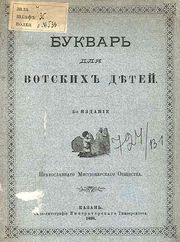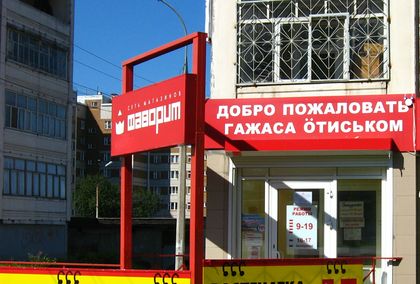Udmurt language
| Udmurt | ||
|---|---|---|
| Удмурт кыл Udmurt kyl | ||
| Spoken in | ||
| Region | Udmurtia | |
| Total speakers | 550,000 (1989 census) | |
| Language family | Uralic
|
|
| Official status | ||
| Official language in | Udmurtia | |
| Regulated by | No official regulation | |
| Language codes | ||
| ISO 639-1 | None | |
| ISO 639-2 | udm | |
| ISO 639-3 | udm | |
| Linguasphere | ||
| Note: This page may contain IPA phonetic symbols in Unicode. | ||
Udmurt (удмурт кыл, udmurt kyl) is a Finno-Permic language spoken by the Udmurts, natives of the Russian constituent republic of Udmurtia, where it is coofficial with the Russian language. It is written in the Cyrillic script with five additional characters. Together with Komi and Komi-Permyak languages, it constitutes the Permic grouping. Among outsiders, it has traditionally been referred to by its Russian exonym, Votyak. Udmurt has borrowed vocabulary from the neighboring languages Tatar and Russian.
Ethnologue estimates 550,000 mother tongue speakers (77%) out of an ethnic population of 750,000 in the former USSR (1989 census).[1]
Contents |
Alphabet
The Udmurt alphabet is based on the Russian Cyrillic alphabet:
Udmurt alphabet
| Uppercase | Lowercase | Transliteration | IPA | Letter name |
| A | a | a | [ɑ] | а |
| Б | б | b | [b] | бэ |
| В | в | v | [v] | вэ |
| Г | г | g | [g] | гэ |
| Д | д | d | [d]; palatal [dʲ] when followed by я, е, и, ё, ю or ь | дэ |
| Е | е | e | [je]; [ʲe] when preceded by д, т, з, с, л, or н | е |
| Ë | ë | ë | [jo]; [ʲo] when preceded by д, т, з, с, л, or н | ё |
| Ж | ж | ž | [ʒ] | жэ |
| Ӝ | ӝ | dž | [dʒ] | ӝэ |
| З | з | z | [z]; palatal [ʑ] when followed by я, е, и, ё, ю or ь | зэ |
| Ӟ | ӟ | dʑ | [dʲʑ] | ӟe |
| И | и | i | [i]; [ʲi] when preceded by д, т, з, с, л, or н | и |
| Ӥ | ӥ | ï | [i] | и с точками |
| Й | й | j | [j] | и краткое |
| К | к | k | [k] | ка |
| Л | л | l | [ɫ]; palatal [lʲ] when followed by я, е, и, ё, ю or ь | эл |
| М | м | m | [m] | эм |
| Н | н | n | [n]; palatal [nʲ] when followed by я, е, и, ё, ю or ь | эн |
| О | о | o | [o] | o |
| Ӧ | ӧ | ö | [ʌ] ~ [ə] | ӧ |
| П | п | p | [p] | пэ |
| Р | р | r | [r] | эр |
| С | с | s | [s]; palatal [ɕ] when followed by я, е, и, ё, ю or ь | эс |
| Т | т | t | [t]; palatal [tʲ] when followed by я, е, и, ё, ю or ь | тэ |
| У | у | u | [u] | у |
| Ф1 | ф | f | [f] | эф |
| Х1 | х | x | [x] | ха |
| Ц1 | ц | c | [t͡s] | цэ |
| Ч | ч | č | [t͡ɕ] | чэ |
| Ӵ | ӵ | tʲč | [t͡ʃ] | ӵэ |
| Ш | ш | š | [ʃ] | ша |
| Щ1 | щ | šč | [ɕ], [ɕː] | ща |
| Ъ2 | ъ | - | твёрдый знак "hard sign" | |
| Ы | ы | y | [ɨ] ~ [ɯ] | ы |
| Ь | ь | ' | [ʲ] | мягкий знак "soft sign" |
| Э | э | è | [e] | э |
| Ю | ю | ju | [ju]; [ʲu] when preceded by д, т, з, с, л, or н | ю |
| Я | я | ja | [jɑ]; [ʲa] when preceded by д, т, з, с, л, or н | я |
- 1 Only used in Russian loanwords and names.
- 2 Silent, but required to distinguish palatalized consonants (/dʲ tʲ zʲ sʲ lʲ n/) from unpalatalized consonants followed by /j/ if followed by a vowel; for example, /zʲo/ and /zjo/ are written -зё- and -зъё-, respectively.
Four of these characters (Ӝ/ӝ, Ӟ/ӟ, Ӥ/ӥ, Ӵ/ӵ) are unique to the Udmurt alphabet.
Phonology
The language does not distinguish between long and short vowels and does not have vowel harmony.
Grammar

Udmurt is an agglutinating language. It uses affixes to express possession, to specify mode, time, and so on.
Lexicon
Based on the style, about 10 to 30 percent of the Udmurt lexicon consists of loanwords. Many loanwords are from the Tatar language, which has also strongly influenced Udmurt phonology and syntax. Words related to technology, science and politics have been borrowed from Russian.
Bibliography
- Kel'makov, Valentin; Sara Hännikäinen (2008) (in Finnish). Udmurtin kielioppia ja harjoituksia (2nd ed.). Helsinki: Suomalais-Ugrilainen Seura. ISBN 978-952-5150-34-6.
- Moreau, Jean-Luc (2009). Parlons Oudmourte. Paris: L'Harmattan. ISBN 2-296-07951-2.
References
External links
- Udmurtology: Udmurt Language, History and Culture(Russian)
- Literature
- The First Udmurt Forum(Russian)
- Udmurt State University (has Udmurt Language Program for English speakers)
- Udmurt language, alphabet and pronunciation
- Uralistica - the world of finno-ugric and samoyed peoples
- Review of Eberhard Winkler, Udmurt, München 2001 (Languages of the World. Materials 212)
|
|||||||||||||||||||||||||
|
|||||||||||
